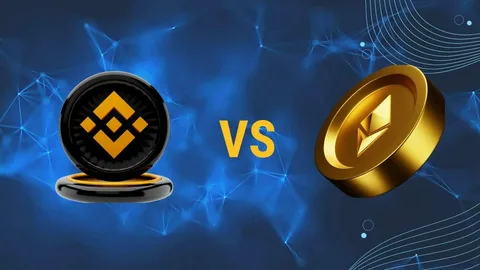In the world of cryptocurrencies, few comparisons are as interesting and debated as BNB vs ETH. Both tokens represent much more than simple digital currencies — they are the native assets of two of the most important blockchain ecosystems in existence. Ethereum pioneered smart contract technology, while Binance has rapidly built a competitive platform with BNB at its core. When it comes to utility, these two giants offer distinct advantages, but they also cater to different types of users and use cases.
Ethereum was launched in 2015 with a clear mission: to expand the capabilities of blockchain beyond just a store of value. It introduced smart contracts, allowing developers to build decentralized applications on a secure, transparent network. This innovation gave birth to an entire industry, including decentralized finance, NFTs, DAOs, and many other projects that are now household names in the crypto space.
BNB, on the other hand, began its journey in 2017 as a utility token for discounts on trading fees within the Binance exchange. It has since evolved into the primary token powering the BNB Chain ecosystem. While it started with a more limited function than ETH, BNB has expanded its use to include smart contracts, DeFi platforms, and decentralized apps. It plays a similar role to ETH within its own network, but with a few notable differences.
One of the key distinctions between Ethereum and Binance’s approach lies in decentralization. Ethereum is more decentralized, with thousands of nodes running the network and many independent developers contributing to its evolution. This ensures strong community governance and long-term resilience, but it also means that changes to the protocol can take longer to implement.
BNB Chain takes a more centralized approach. It uses a smaller number of validators, often selected or controlled by Binance itself. This enables faster transactions and greater efficiency but at the cost of some decentralization. For developers and users who prioritize speed and low fees, BNB Chain can be a more attractive option. For those who value openness and decentralization, Ethereum is usually the preferred choice.
Another aspect to consider in the BNB vs ETH debate is transaction cost. Ethereum has long been criticized for its high gas fees, especially during periods of network congestion. Although Ethereum’s transition to proof-of-stake with Ethereum 2.0 has brought improvements, fees can still be a barrier for smaller users. BNB Chain offers significantly lower fees, making it more accessible for developers launching projects with limited resources or users making frequent transactions.
The developer ecosystem is also crucial. Ethereum boasts a larger and more established community of developers, projects, and tooling. Most innovations in DeFi, for example, start on Ethereum before being adapted to other chains. However, BNB Chain has been catching up, attracting new projects with its speed, cost-efficiency, and funding support from Binance.
In terms of utility for users, both BNB and ETH have strong cases. ETH is widely used across the crypto world for interacting with DeFi protocols, NFT platforms, and Layer 2 solutions. It’s become almost a standard token for many blockchain-based applications. BNB, meanwhile, is tightly integrated with the Binance ecosystem — from trading and launchpads to staking, liquidity farming, and payments. Users who are active on Binance or use BNB Chain frequently will find BNB to be more useful in that context.
Cross-chain compatibility is becoming more important, and both Ethereum and BNB Chain are working toward greater interoperability. Ethereum has numerous Layer 2 solutions and sidechains, while Binance continues to expand bridges to connect its network to other blockchains.
Ultimately, choosing between BNB and Ethereum may come down to what kind of crypto experience you want. If you’re focused on decentralization, innovation, and long-term adoption, Ethereum is a strong candidate. If speed, affordability, and access to a growing ecosystem of applications are your priorities, BNB may be the better choice. In reality, many investors and developers use both, recognizing that each has strengths that complement the other.
As smart contract platforms continue to evolve, so will the competition between Binance vs Ethereum. But instead of a battle for dominance, the future may be shaped by coexistence and specialization — with Ethereum pushing the boundaries of decentralized innovation and BNB leading in user-friendly applications and scalability.



